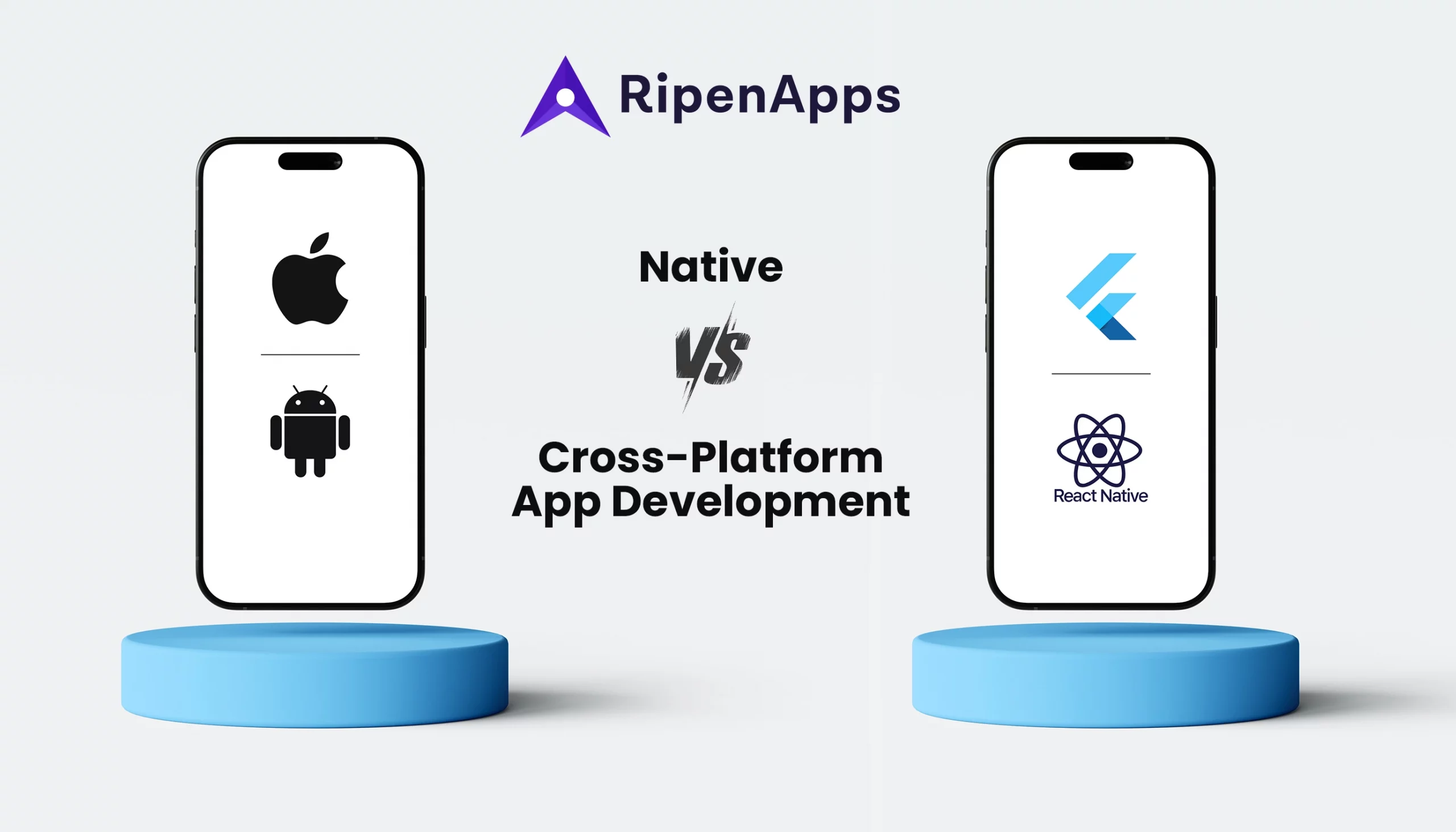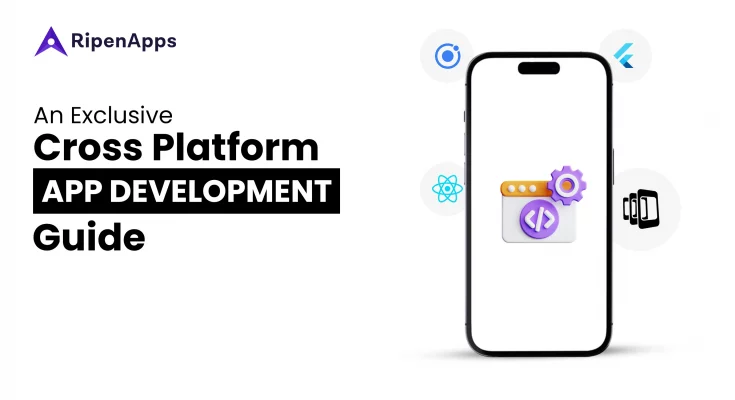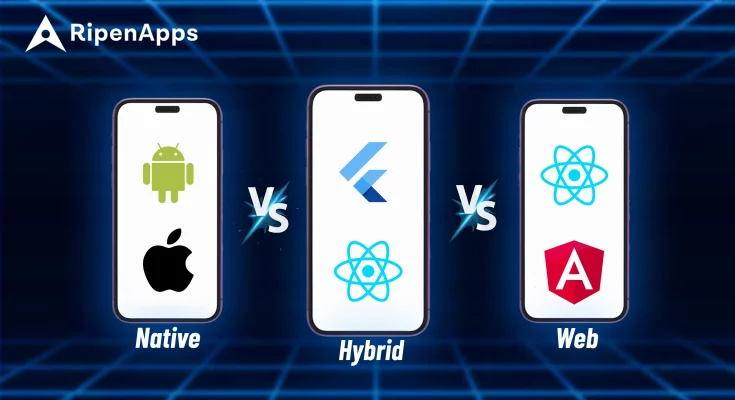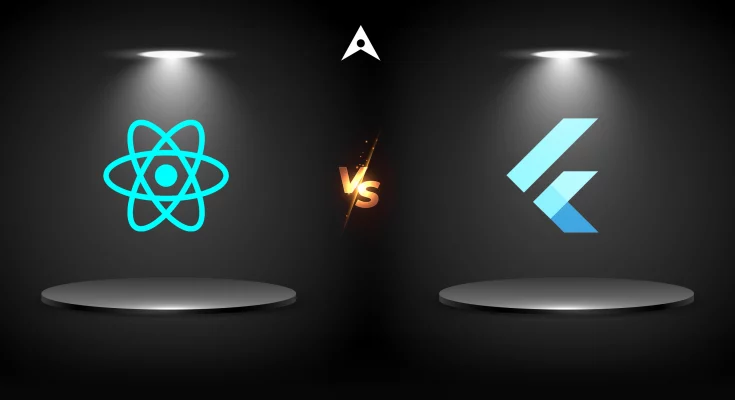Since the inclusion of the concept of cross-platform app development, a debate has continually emerged about which one is optimal for mobile app development: cross-platform app development or native app development.
Well, if we look at the research, then there has been massive growth in the mobile app market since its inception until now.
Allied Market Research says that the global mobile app market was valued at $208.5 billion in 2022, and it is expected to reach $777.4 billion by 2032, showing a CAGR of 14.4% by 2032.
Further, some other recent reports state that Android and iOS are the two most frequently used operating systems for smartphones. Android holds a market share of 70.69%, and iOS has a market share of 28.58%. At present, there are over 8.3 million apps available across iOS and Android platforms on a global level.
So, which one you will choose for your mobile app development idea, native app development, or will kill two birds with one stone by opting cross platform mobile app development? We will help you find the difference.
This blog will help you make an informed decision and choose the best approach between native and cross platform for your mobile app project. Let’s get started;
Table of Contents
Understanding Native App Development
Native app development is the process of mobile app development for specific platforms, either iOS or Android.
Developers have to apply platform-specific languages to develop the native application. Building Android apps includes Java, Kotlin, and Python. For the iOS mobile OS, the languages include Objective-C and Swift. The popular native mobile app examples are Instagram, Facebook, Twitter, WhatsApp, Google Maps, etc.
Pros of Native App Development
Let us have an exhaustive view of the pros of native app development to help you understand it more clearly.
Elevated Performance
Since native apps are platform-specific, codes for native apps cherish direct access to the host’s operating system and functionalities.Simple and direct interaction with the native features of the app helps enhance the app’s performance, mainly when offering graphics and multimedia content.This will reduce the risk of downtime from crashes or freezes, thus enhancing the mobile app’s performance.
Enhanced User Interface
By seamlessly integrating with the mobile OS, native apps provide a smooth interface to the users, so that they find ease in navigating a familiar interface without bluffs and bugs.
Mobile App Development Platforms
Cross-platform app development provides developers with the list of best iOS and Android app development platform. These platforms are crucial to creating cutting-edge apps. Mobile apps made using these platforms help businesses stand out.
Read Also : Key Future Trends That Will Dominate The Cross Platform Mobile App Development
Better Positioning on App Stores
Due to their high performance and easy-to-use features, native apps hold a better position on the App Store. It is especially visible in the gaming section, where native is still the preferred choice.
Hardware support
Some apps want full hardware support without any hurdles. If your app idea falls under this category and you will require the phone’s hardware elements, then you have to choose native app development.
Cons of Native App Development
Although native mobile application development comes with ample advantages, there are a few disadvantages associated with it. Here are some of the key ones.
Time-Consuming and Costly
It’s understood that creating apps for different platforms (iOS or Android app development) can be a long or time-consuming process. The same code for an app cannot be deployed on another platform. It takes more time to rewrite the code, as well as making more money.
Missed Opportunities
Developing an app for a single platform could be like missing opportunities to play with different platforms and lacking the ability to grab asserted revenue for your efforts. That’s why you need to choose cross platform app development company.
Understanding Hybrid or Cross-Platform App Development
As the name implies, the app, which can run on various operating systems, is known as a cross-platform app, and the method of development is known as cross-platform app development or Hybrid app development. The development frameworks can provide the best cross platform app development. It can be one approach for all destinations. Cross platform app examples are eBay, Alibaba, Google Pay, and ByteDance.
Pros of Cross Platform App Development
Like native app development, entrepreneurs, the development team, and users have several benefits of developing a cross-platform mobile app.
Cost and Time-saving
The “Write once, run everywhere” approach allows mobile app developers to reuse the same code on multiple platforms, which will result in less cost and also save a lot of time.
Quick and Easy Deployment
It does not take too much knowledge of different programming languages to build a cross-platform mobile app, but it requires a few masterstrokes to hit the goal. Since it takes a few alterations to develop code for another platform, it saves time as well as cost.
Wider Audience Reach
Building cross-platform apps provides access to a broader range of target audiences, which could lead you to the path of revenue generation.
Cons of Cross Platform App Development
With the strong benefits to businesses, some cross-platform app development challenges also need to be addressed. Here are some of them.
Performances Glitches
As compared to native apps, cross-platform apps do not integrate smoothly with their targeted platforms. This is because the ultimate aim is to run the application on two platforms using a single codebase. And it might affect performance in certain situations.
User-Experience
Due to the reusability of codes on various platforms, apps may fail to offer a robust user experience. Native apps are specifically designed to build with the platform, right from the user experience to everything. Cross platform, on the other hand, might have a reduced level of user experience. Although the difference is not so huge in modern times, it is what it is.
What Is the Difference Between Native and Cross Platform App Development?
When choosing the best in native vs cross platform app development, we need to do the comparison on some essential pointers. These pointers are;
|
Native App Development |
Cross Platform App Development |
|
| Development Time |
Slow |
Fast |
| App Performance |
Seamless |
Performance Issues |
| User Experience |
Better |
Basic |
| Tech Stack |
Swift, Kotlin |
Flutter, React Native, Xamarin |
| Hiring Developers |
Wider Availability |
Low Availability |
| App Updates |
Time-Consuming |
Time-Saving |
| Offline Access |
Accessible Without Internet |
Accessible Through Internet |
| Cost-Saving |
No |
Yes |
How Much Time Will It Take
Development time is the overall timeframe that an app development process takes. In native app development, the time frame is separated for Android and iOS platforms. If you are building an app by hiring dedicated mobile app developers for both platforms, then both teams will have their own time frame, resources, and budget. Whereas, cross platform mobile app development time will be less since developers can use a single code baseline for both platforms.
App Performance
Let us make it easy to understand cross platform vs native app performance. Which will perform better—Android headphones with iOS or AirPods? Of course, the answer will be the latter one. This is because AirPods are native to Apple devices. They are built specifically for them, which is why they will perform better with iOS devices. Similarly, if an app is built specifically for Android, then it will work better on Android. Native provides seamless app performance as compared to cross platform.
User experience
This pointer is gradually decreasing as cross-platform app development technologies become better. In the near future, businesses will have no real difference in the user experience. However, when apps are natively built, they perform faster, leading to a better user experience. An experienced ui ux design agency follows native app development approach to provide an appealing user experience.
Technology Stack
Both native and cross platform app development demand their own technology stack expertise. For example, for native app development, Swift and Kotlin languages are specific to iOS and Android, respectively. Whereas for hybrid app development, the tech stack will be Flutter and React Native. Developers have delivered the best cross platform mobile apps using these tech stacks.
Finding and Hiring Developers
After understanding the technology stack, it will be easy for you to understand this pointer. For native app development, a business has to hire mobile app developers who are experts in native app development technologies. There is a wider availability of native app developers as compared to cross platform app developers. But the gap is getting narrower as developers update themselves with new modern tech stacks.
App Updates
Updating the application remains another key difference between native and hybrid app development. It is less complex to update cross-platform apps since the codebase line remains the same. However, to update a native app, one has to release an update separately for Android and iOS.
Access Your Apps Offline
Without a doubt, native apps are known for keeping up with the offline concept. For example, games are offline. Or if they are online, they have the full potential to run in offline mode because they are built with native concepts. However, cross-platform apps are more attached to the internet.
Save Your Money
Who does not want to stay cost-efficient? Cross-platform/multiplatform mobile app development is more feasible for startups since the overall cost incurred is lower. Hiring native developers for two platforms costs more. It is crucial for you to perform a feasible analysis of your app idea.
Time to Decide Between Native and Cross Platform
Now comes the most important point. With the above information, we are sure that you have gathered enough information associated with hybrid and native app development.
If app performance is your main concern and you want to take full advantage of your mobile phone’s hardware, then native app development is for you. Native is always best for gaming apps if you aim to build a game that can run offline and is optimized efficiently.
Cross platform app development is a more cost-effective choice, as we have discussed in the above section. Also, if you are short on time, i.e., do not have enough time frame to build apps both for iOS and Android, then cross platform is the best fit for your business.
Conclusion
It is difficult to choose between native & cross platform app development. Ultimately, you should choose the platform that will fulfill your specific requirements.
If you want native app developers or cross platform app developers, then we are here for you. RipenApps is a leading mobile app development company in USA, and India. We have an in-house team of developers who have together built and deployed more than 600 applications. No matter what you want to target, our dedicated developers will ensure all your needs are met and deliver a flawless application.
FAQs
Q1: Which is better cross-platform or native app development?
Cross-platform emerges as better than native app development but the margin is very low because the best choice depends on the requirements of businesses.
Q2: What is the difference between cross-platform and native app development?
The main difference between native and cross platform app development is the operation system the app is built for. While native app development includes building specific apps for iOS and Android, cross platform is building apps for multiple platforms.
Q3: Is cross-platform the best choice for mobile app development?
Yes, cross platform can be the best choice for mobile app development if you are looking to build apps for multiple platforms cost-efficiently and with limited time.
Q4: Do cross-platform apps provide better performance than native apps?
Cross platform apps provide better performance, platform-specific features, cost-efficiency, and faster development. However, the final decision depends on specific project requirements.











 India
India USA
USA Australia
Australia Canada
Canada UK
UK UAE
UAE
